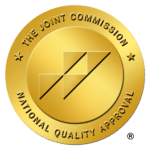The Role of EMDR in Addiction Recovery
Eye Movement Desensitization and Reprocessing (EMDR) is a powerful, evidence-based therapy that helps individuals heal from trauma and emotional distress. For many men struggling with addiction, unresolved trauma plays a significant role in the development and continuation of substance use disorders. EMDR provides a way to process and heal from these traumatic experiences, which often contribute to the emotional pain that fuels addiction. At Firm Foundation, we integrate EMDR into our Christ-centered addiction treatment programs, helping men address the underlying emotional wounds that contribute to substance use and find healing through faith and evidence-based therapy. Learn more about EMDR therapy near Atlanta.
EMDR helps individuals reprocess traumatic memories in a safe, therapeutic environment, reducing their emotional impact and allowing clients to develop healthier coping mechanisms. By addressing both the trauma and the addiction, EMDR helps individuals break free from the cycle of substance use and move toward lasting recovery.
What is EMDR Therapy?
Eye Movement Desensitization and Reprocessing (EMDR) is a therapy that was developed to help individuals process traumatic experiences and emotional pain. EMDR is based on the idea that traumatic memories can become “stuck” in the brain, leading to emotional and psychological distress. These unprocessed memories can contribute to addiction by triggering feelings of anxiety, depression, or fear, which individuals may attempt to numb through substance use.
EMDR works by using bilateral stimulation—often in the form of guided eye movements—to help the brain reprocess these traumatic memories. During an EMDR session, the therapist guides the client through the memory while encouraging bilateral stimulation. This process allows the brain to reprocess the memory in a healthier way, reducing its emotional impact and helping the individual gain control over their reactions.
EMDR is particularly effective for individuals who have experienced trauma, such as:
- Physical or emotional abuse
- Childhood neglect
- Grief and loss
- Witnessing violence
- Accidents or natural disasters
How EMDR Works in Addiction Recovery
Addiction and trauma are often closely linked. Many individuals who struggle with substance use disorders turn to drugs or alcohol as a way to cope with unresolved trauma. EMDR helps individuals process these traumatic experiences, reducing their emotional impact and helping them build healthier coping mechanisms for the future.
Processing Traumatic Memories: One of the main goals of EMDR is to help individuals process traumatic memories that may be contributing to their addiction. Unresolved trauma can create emotional pain, anxiety, and depression, which often fuel substance use. EMDR provides a safe and structured way to work through these painful experiences.
- How Trauma and Addiction are Connected:
Trauma often triggers feelings of fear, shame, and helplessness. Many individuals use substances to numb these painful emotions, creating a cycle of addiction. By processing the trauma, EMDR helps break this cycle.
Reducing Cravings and Triggers: Trauma can serve as a powerful trigger for substance use. EMDR helps reduce the emotional intensity of these triggers, allowing clients to respond in healthier ways when faced with stress or cravings.
- How EMDR Reduces Cravings:
By processing the traumatic memories that underlie addiction, EMDR helps clients become less reactive to emotional triggers. This, in turn, reduces cravings and the likelihood of relapse.
Building Healthier Coping Mechanisms: As individuals heal from their trauma through EMDR, they are able to develop healthier coping mechanisms for managing stress, anxiety, and emotional pain. Instead of turning to substances, clients learn to rely on mindfulness, self-compassion, and other recovery tools.
- How EMDR Supports Long-Term Sobriety:
Healing from trauma allows individuals to build a stronger foundation for recovery. Without the emotional burden of unprocessed trauma, clients are better able to focus on their sobriety and build a healthier, more fulfilling life.
Integrating Faith with EMDR at Firm Foundation Treatment Center
At Firm Foundation, we believe that faith is an essential part of the recovery process. Our Christ-centered approach to EMDR therapy helps clients heal not only emotionally but spiritually as well. We integrate spiritual practices, such as prayer and scripture, into our EMDR sessions to provide holistic healing for our clients.
How Faith Enhances EMDR:
- Prayer and Reflection:
During EMDR sessions, clients are encouraged to incorporate prayer and reflection as a way to connect with their faith and seek guidance from God. This spiritual support can provide comfort and strength during the healing process. - Finding Peace through Scripture:
The Bible offers wisdom and guidance for overcoming adversity, including trauma and addiction. Clients are encouraged to reflect on scripture passages that resonate with their recovery journey, helping them find peace and direction as they work through their trauma. - Strengthening Spiritual Connection:
EMDR helps individuals process trauma and reduce emotional distress, which can deepen their spiritual connection. As clients heal emotionally, they are better able to focus on their relationship with God and their faith community.
The Benefits of EMDR for Addiction Recovery
EMDR offers several key benefits for men in recovery from addiction, particularly those with a history of trauma. Some of the advantages include:
- Healing from Trauma: EMDR is highly effective in helping individuals process and heal from traumatic experiences, which often contribute to addiction.
- Reducing Emotional Triggers: By reducing the emotional intensity of traumatic memories, EMDR helps clients become less reactive to triggers that could lead to relapse.
- Building Healthier Coping Skills: As clients heal from trauma, they are better able to develop healthy coping mechanisms for managing stress, anxiety, and cravings.
- Improving Emotional Regulation: EMDR helps clients gain control over their emotional responses, reducing the likelihood of impulsive decisions and substance use.
- Supporting Long-Term Recovery: By addressing the root causes of addiction, EMDR provides a strong foundation for long-term sobriety and emotional well-being.
Case Study: Healing Trauma and Addiction with EMDR
David, a 37-year-old client at Firm Foundation Treatment Center, came to us struggling with alcohol addiction. His substance use was deeply connected to unresolved trauma from his childhood, including emotional abuse and neglect. Through EMDR, David was able to process these painful memories in a safe and supportive environment. As he worked through the trauma, he found that his cravings for alcohol decreased, and he was better able to manage his emotional responses without turning to substances. Today, David is sober and continues to build a healthier, more fulfilling life with the support of his faith.
Why Choose Firm Foundation Treatment Center for EMDR?
At Firm Foundation Treatment Center, we are committed to providing comprehensive, Christ-centered care for men in recovery. Our EMDR program is designed to help clients heal from trauma, reduce emotional triggers, and build healthier coping mechanisms for long-term sobriety.
- Experienced EMDR Therapists: Our team of licensed therapists is highly trained in EMDR therapy and other evidence-based approaches, ensuring that clients receive the highest quality of care.
- Christ-Centered Healing: We believe that faith is a powerful tool for healing, and we integrate spiritual guidance into all aspects of EMDR therapy.
- Personalized Treatment Plans: Each client’s trauma and recovery journey are unique. We tailor our EMDR sessions to meet the specific needs of each individual, ensuring that they receive personalized care.
Testimonial
“EMDR at Firm Foundation helped me process trauma that I had been carrying for years. I didn’t realize how much it was affecting my addiction until I started healing. The combination of therapy and faith has made all the difference in my recovery.” — Michael, 35, Woodstock, GA
Get Started with EMDR in Woodstock, GA
If you or a loved one is struggling with addiction and unresolved trauma, Eye Movement Desensitization and Reprocessing (EMDR) at Firm Foundation Treatment Center can provide the tools and support you need for healing. Our Christ-centered approach, combined with evidence-based therapies like EMDR, helps men break free from the cycle of trauma and addiction. Contact us today to learn more about how EMDR can be an essential part of your recovery journey.













